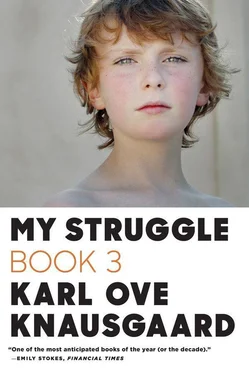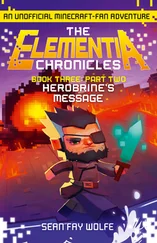I looked at him. Then I saw the line of juice on the wallpaper.
“You’d better wash it off, you idiot,” I said.
“It won’t wash off,” he said. “The stain will just get bigger. Dad will be livid when he sees that. What’s wrong with you?”
“He might not see it,” I said.
Yngve just gawped at me.
“Well, we can hope,” he said, bending down and taking the orange into the kitchen. From the rustling noises that followed I gathered he was putting it at the very bottom of the garbage can. He came back with a cloth and wiped the floor.
I was trembling so much I could barely stand upright.
The juice ran in a thin line and I couldn’t imagine how Dad could avoid seeing it when he came home.
Yngve washed the kettle and the two cups. Threw away the bread, picked up the crumbs. I sat in the chair by the dining table with my head in my hands.
Yngve stopped near me.
“Sorry,” he said. “I didn’t mean to make you cry.”
“Yes, you did.”
“It’s just that you get so angry,” he said. “Surely you can see that it’s tempting? I have said sorry.”
“It’s not that,” I said.
“What is it then?”
“My funny walk.”
“Come on,” he said. “Everyone walks in a different way. The main thing is to move forward. I was only kidding, really. I wanted to make you angry. And I succeeded. The way you walk is no stranger than anyone else’s.”
“Sure?”
“Sure as eggs are eggs.”
When Dad came home I was in bed. In the darkness I lay listening to his footsteps. They didn’t stop on the landing as I had expected but continued into the kitchen. He fiddled around in there for a while before coming out again. And he didn’t stop on the landing this time, either.
He hadn’t seen anything.
We were saved.
The next evening I went to the swimming class with Geir. We caught the bus from Holtet to the bus station in Arendal and walked up the hills to Stintahallen, each carrying a bag over our shoulders. In my bag I had some dark-blue Arena swim trunks, a white Speedo cap with the Norwegian flag on the side, a pair of Speedo goggles, a bar of soap, and a towel. We had been members of Arendal Swim Club since the previous winter. We could barely swim then, just getting from one end of the pool to the other was an enormous effort, bordering on the impossible, but since it was actually expected of us, as an absolute minimum in a swim club, and the coach, a man with tattoos on his arms who wore clogs, followed us along the side of the pool shouting, it took us a surprisingly short time to get by without any problems. We weren’t good, at least not if you compared us to the older boys who sometimes walked around inside, with their slim, long-limbed yet muscular bodies, and who powered through the water with open mouths and bug-eye goggles. In comparison to them we were more like tadpoles, I sometimes mused, splashing and straining and just as likely to swim sideways as forward. But even though we gradually improved and could soon swim a thousand meters in the course of a training session it wasn’t thanks to my progress that I continued, I knew I would never be a competitive swimmer because when the competitions came and I gave everything it was never enough, I couldn’t even overtake Geir — no, it was all the rest I liked, starting the moment we clambered onto the bus and continuing through the evening darkness on the road to Arendal, the deserted town we passed through, the shops we always stopped outside on our way to the class, and inside the hall, this large public building with its strange mixture of inside and outside, which we were funnelled through from standing at the entrance wrapped up in winter clothes to standing almost naked, fifteen minutes later, wearing only a strip of cloth at the edge of the pool, after having passed through the minor ritual of undressing, showering, and dressing, and then throwing ourselves into the wonderfully transparent, cold water that smelled of chlorine. That was what I liked. The sounds echoing around the pool, the night outside the windows, the coral-jewel partition between lanes, the diving boards, the thirty-minute-long hot showers we had afterward. Then the process was reversed and we went from being pale, fragile, semi-naked boys with big heads to once again standing fully clothed in the winter outside, with wet hair under our hats and the smell of chlorine on our skin, our limbs deliciously tired.
I also liked the feeling of being enclosed inside myself when I put on my swimming cap and goggles, not least during competitions, when I had a whole lane of my own waiting for me beneath the starting blocks, but often the thoughts waiting there, in swimming’s astronaut-like loneliness, became chaotic and sometimes also panicked. There could be water in the goggles, it slopped against my eyes, making them sting and preventing me from seeing, which of course upset the purity of my thoughts. I could swallow water and I could make a mess of the turn, which left me so breathless that I swallowed more water. And I could see that the swimmers in the adjacent lanes were already way ahead, which I was told by the voice inside me intent on winning, and I started a discussion with it. But even though this inner dialogue, which carried on calmly while I was swimming and fighting for all I was worth, and was therefore lent an almost panic-stricken aura, a bit like a military HQ deep in an underground bunker with officers speaking in controlled tones while the battles raged overhead, had the effect of me increasing the tempo, and for a few seconds I really gave it my all, it didn’t help in the slightest, Geir was ahead of me and would remain so, and I couldn’t understand that, I was obviously better than him, I knew so much more than him, also about the will to win. Nevertheless, he was the one to touch the pool wall then, and I touched it … … … … … … … … … … … … … … … … … … … … … … … … … … then.
When the coach blew his whistle and the session was over for another week, it was not without some relief that I put my hands on the edge of the pool and heaved myself up, to run with Geir across the tiled floor into the shower, where the pace seemed to be slower, at least our pace was released as we took off our caps and trunks and entered the showers, to feel with closed eyes the heat spreading through our bodies, no longer needing to say or do anything, not even having to bother to laugh as one of the men on his way into the pool, which was now open for all comers, began to sing. There was something dreamlike about the atmosphere inside, the white bodies that appeared in the doorway and stood under the showers with slow, introspective movements, the sound of water beating against the tiles and mingling with the muffled noise from outside, the steam saturating the air, the hollow resonance of voices whenever anyone spoke.
Normally we stood around long after those we had trained with had gone. Geir with his face to the wall, me with my face to the room, to hide my backside. I snatched occasional glances at him when he wasn’t paying attention. He had thinner arms than me, yet he was stronger. I was a little taller than him, yet he was faster. That wasn’t why he swam faster than me, though. It was because he wanted it more. It was different with his drawings, they were just something he could do, it was in him, it had always been there. Apart from people, he could reproduce everything in precise detail. Houses, cars, boats, trees, tanks, planes, rockets. It was a mystery how he could do it. He never copied, as I did, his mother never let him use either a ruler or an eraser. Now and then his Norwegian could throw up oddities, such as fantisere and firkanti instead of fantasere and firkantet, and en appelsin instead of et appelsin, and even though I corrected him every time, he continued to say them as though these terms were a feature of him that was as permanent as the color of his eyes or the set of his teeth.
Читать дальше












